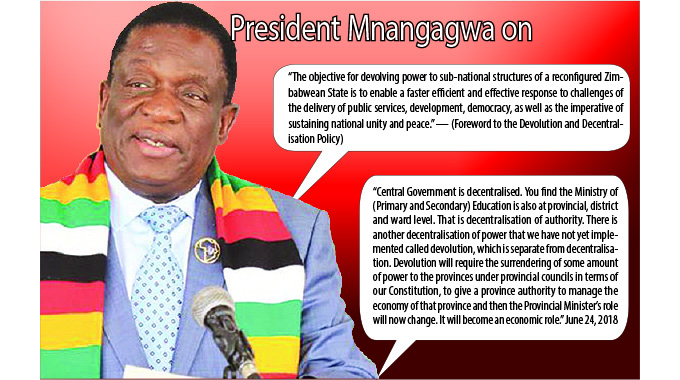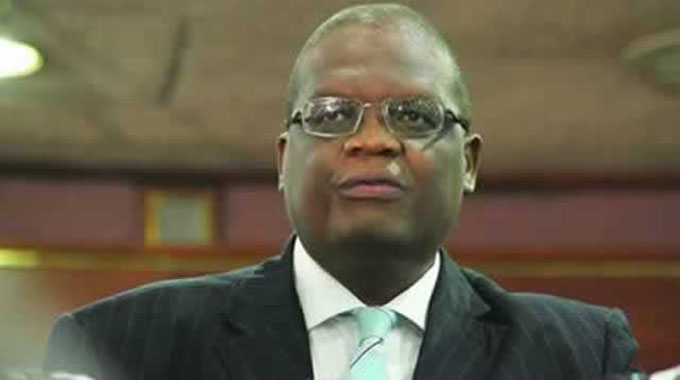Proposed laws to propel devolution

Lovemore Chikova-Development Dialogue
New laws on devolution expected to be debated in the fourth session of the Ninth Parliament will ensure that the development concept is perfected and fully implemented faster.
The laws are the Provincial Councils Amendment Bill, Urban Councils Amendment Bill, Rural District Councils Amendment Bill, Regional Town and Country Planning Amendment Bill and Traditional Leaders Amendment Bill.
The Bills were revealed by President Mnangagwa in his State of the Nation address while he opened of the fourth session of the Ninth Parliament of Zimbabwe last week.
Speaking on the new legislation, the President said: “Allow me to highlight that Parliament will soon be requested to consider legislation to the implementation of the devolution agenda. Of special note is the presentation of the Provincial Councils Amendment Bill.
“The requisite legislation used by the lower tiers of the State to ensure efficient implementation of the devolution agenda will also be amended. These include the Urban Councils Amendment Bill, Rural District Councils Amendment Bill, Regional Town and Country Planning Amendment Bill and the Traditional Leaders Amendment Bill.”
The legislation comes in the wake of the Constitution of Zimbabwe Amendment (No.2) Act which sets out the setting up of the metropolitan and provincial councils to push the devolution agenda.
The setting up of the attendant legislation mentioned by President Mnangagwa will ensure that the processes around the implementation of devolution are done in line with the provisions of the constitution.
For devolution to be successful, there is need to incorporate the relevant structures and spell out clearly the roles they will play in ensuring development takes place in all areas.
This means there is need to separate the roles of urban councils, rural district councils and traditional leaders so that there is no duplication of duties or creation of conflict in their line of work.
Devolution will also reconfigure regional planning and hence the coming in of the Regional Town and Country Planning Amendment Bill.
The legislation outlined by President Mnangagwa is relevant to the smooth and successful implementation of the devolution agenda.
Under devolution, there will be three tiers of Government: the central government, the provincial and metropolitan councils and the local authorities.
What is clear about this structure of governance is that Zimbabwe will remain a unitary state, where the central government retains political power and authority over the jurisdiction.
In this scenario, the lower structure of governance will retain economic power and leeway to decide on economic issues, with the central government having an oversight role on such decisions.
Under this devolution structure being followed by Zimbabwe, the lower structures of governance will exercise devolved powers, but will not operate at the same level with the central government.
The proposed new laws will spell out the actual roles of these lower structures and how they are expected to participate in aiding devolution and eventually the development of their areas.
The announced Bills governing these lower structures are drafted in line with the provisions of the Constitution of Zimbabwe Amendment (No 2) Act.
The Constitution is very clear on setting the parameters for devolution, leaving the specific legislation to deal with the perfection of how exactly each arm of governance will operate.
The Provincial Councils Act is expected to spell out the devolving of responsibilities to the provincial and metropolitan authorities, thus facilitating coordination with the central government and other lower structures.
The Rural District Councils Amendment Bill will ensure a bigger autonomy by the rural district councils in terms of decisions they can make on development.
The situation is the same with the urban councils whose roles will be spelt out by the Urban Councils Amendment Bill.
Traditional leaders’ role will be clarified by the Traditional Leaders Amendment Act.
The traditional leaders play an important role in development as the Traditional Leaders Act gives them some powers in terms of jurisdiction and authority.
In many cases, there have been cases publicly debated of rural district councils and traditional leaders conflicting when it comes to development, especially on the issues of exercising authority and jurisdiction.
It is important to have a brief look at what the Constitution of Zimbabwe Amendment (No.2) Act says about the structures that will drive devolution.
This is where the legislations outlined by President Mnangagwa — the Provincial Councils Amendment Act, the Urban Councils Amendment Act, the Rural District Councils Amendment Act, the Regional Town and Country Planning Amendment Bill and the Traditional Leaders Amendment Act — are driven from.
The Constitution makes it clear that there will be a provincial council for each province and a metropolitan council for each metropolitan province, consisting of:
A chairperson of the council, elected in terms of section 272
10 mayors and chairpersons, by whatever title they are called, of all urban and rural local authorities in the province concerned
10 women elected by a system of proportional representation referred to in subsection
The constitution expects the legislation on devolution to make provision for the establishment and functions of the provincial and metropolitan councils.
These are expected to spell out the operating procedures of the councils, their functions, and appointment and conditions of service, and how employees of the councils can be removed.
According to the Devolution and Decentralisation Policy, Government jurisdiction over local authorities to which power would have been devolved will relate to regulation through setting of the legal, policy and standards frameworks within which sub-national tiers will operate and such functions will be carried out through a mandated ministry.
The relationship will also entail monitoring to facilitate oversight of the maintenance of standards and adherence of local authorities to appropriate central government policy and legal frameworks.
The central government will also facilitate capacitation of sub-national tiers of Government to deliver quality services to the citizens within their jurisdictions.
The new legislation is expected to incorporate functions of provincial and metropolitan councils such as to plan and implement social and economic development activities and coordinate and implement government programmes.
They are also expected to plan and implement measures for the conservation, improvement and management of natural resources and promote tourism and developing facilities.
With the implementation of devolution being fast-tracked by the forthcoming laws, the capacity of the lower structures to successfully implement the development concept will be enhanced.
Issues regarding inefficiencies, mismanagement, corruption and maladministration, especially in local authorities, have been constantly raised before.
Other local structures, including provinces, actually lack human resources to come up with a meaningful roadmap that can result in the turnaround of fortunes for their areas.
There is need for expertise in technical issues like budgeting and engineering, which skills can be lacking at the lower level structures.
These issues and problems are expected to be addressed by the forthcoming new and specific legislation, with the involvement of central government set to strengthen the capacity of the lower structures in carrying out their mandate.
The devolution development concept has already taken roots in the provinces and districts throughout the country, with local leaders making it a daily part of their development jargon.
This will make it easy to implement provisions of the new legislation outlined to Parliament by President Mnangagwa as everyone is now moving on the same slate.
Devolution signifies a new direction in how the country’s system of governance works, and is being implemented in tandem with the National Development Strategy 1 and Vision 2030 meant to attain an upper middle income economy by 2030.
The idea is for provinces to spearhead the economic transformation of their areas, and then ultimately help the national economy grow, hence the legislation in the pipeline which specifically tackle the configuration of the lower structures of governance.
Devolution is provided for in Chapter 14 of the Constitution, with its main goal being the equitable allocation of national resources and the participation of local communities in the determination of development priorities within their areas.
It entails that provinces should have economic and social indicators to track their development in terms of productivity, employment creation, export earnings and import substitution initiatives as part of the periodic provincial reports and briefs they present.
Zimbabwe is endowed with vast natural and human resources which have a potential to help in the achievement of the devolution agenda.








Comments